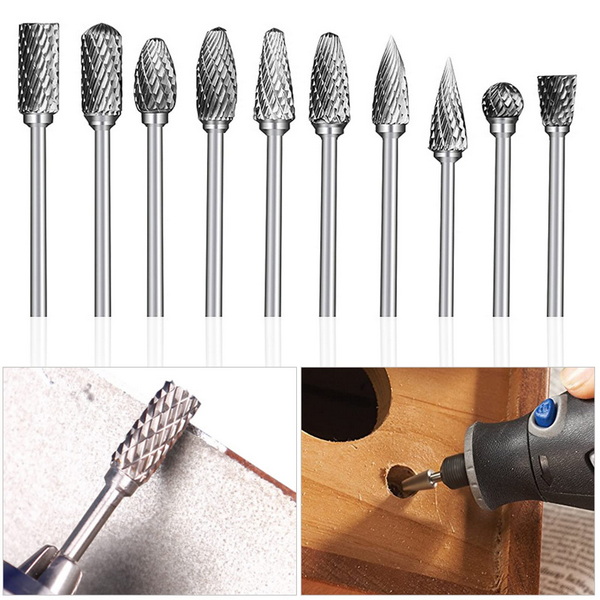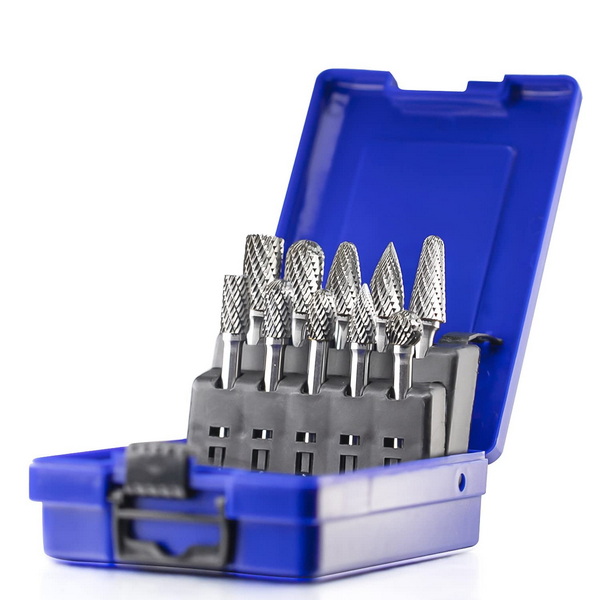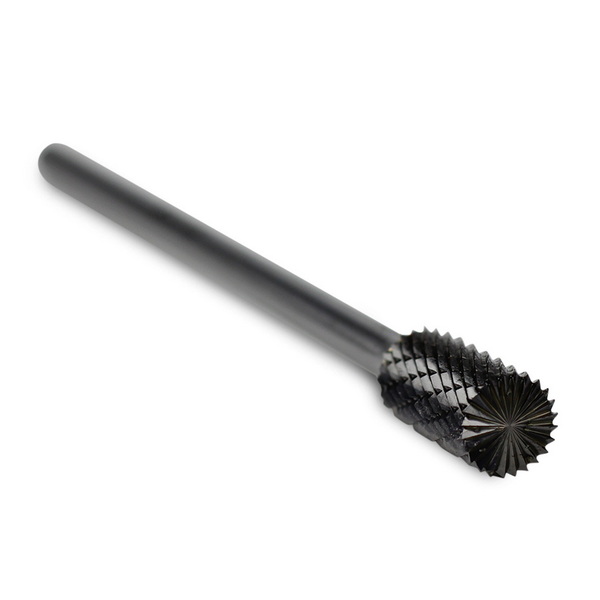Content Menu
● Introduction
● What is Tungsten Carbide?
>> Properties of Tungsten Carbide
>> Applications of Tungsten Carbide
● Types of Tungsten Carbide Files
>> File Shapes and Their Uses
● Can Tungsten Carbide Files Work on Metal?
>> Applications in Metalworking
>> Specific Industries Utilizing Tungsten Carbide Files
>> Advantages of Using Tungsten Carbide Files on Metal
● Limitations of Tungsten Carbide Files
>> Comparison with Other File Materials
● Proper Usage Techniques
>> Step-by-Step Guide to Using Tungsten Carbide Files
● Maintenance of Tungsten Carbide Files
● Further into Applications
>> Custom Tool Making
>>> Case Study Example
>> Jewelry Design
>>> Visual Example
>> Woodworking Applications
● Safety Considerations When Using Tungsten Carbide Files
>> Protective Gear Recommendations
>> Handling Instructions
● Conclusion
● FAQ
>> 1. What metals can tungsten carbide files work on?
>> 2. How do I maintain my tungsten carbide file?
>> 3. Are tungsten carbide files suitable for beginners?
>> 4. Can I use tungsten carbide files on softer materials?
>> 5. How long do tungsten carbide files last?
● Citations:
Introduction
Tungsten carbide files are renowned for their durability and effectiveness in shaping and finishing materials. This article explores whether tungsten carbide files can effectively work on metal, examining their composition, applications, advantages, and limitations. We will also provide visual aids to illustrate key points and a comprehensive FAQ section at the end.

What is Tungsten Carbide?
Tungsten carbide is a composite material made from tungsten and carbon atoms. It is known for its exceptional hardness and resistance to wear, making it a popular choice in various industrial applications.
Properties of Tungsten Carbide
- Hardness: Tungsten carbide ranks around 9 on the Mohs scale, making it one of the hardest materials available.
- Durability: It can withstand high temperatures and pressures without degrading.
- Corrosion Resistance: Tungsten carbide exhibits excellent resistance to corrosion, enhancing its longevity in various environments.
Applications of Tungsten Carbide
Tungsten carbide is not only used in files but also finds applications in various industries:
- Cutting Tools: Used in drills, saw blades, and milling tools for metalworking.
- Jewelry: Popular in wedding bands due to its scratch resistance.
- Mining: Utilized in drill bits for oil and gas extraction.
Types of Tungsten Carbide Files
Tungsten carbide files come in various shapes and sizes, each designed for specific tasks. The most common types include:
- Flat Files: Ideal for flat surfaces and edges.
- Round Files: Suitable for enlarging holes or smoothing curves.
- Half-Round Files: Versatile for both flat and curved surfaces.
- Square Files: Best for corners and sharp edges.
File Shapes and Their Uses
1. Flat Files: Commonly used for smoothing flat surfaces or creating sharp edges on metal parts.
2. Round Files: Excellent for filing holes or rounding out corners, often used in automotive repair.
3. Half-Round Files: These files combine the features of flat and round files, making them versatile for various tasks.
4. Square Files: Perfect for creating precise corners or grooves in metalwork.
Can Tungsten Carbide Files Work on Metal?
Yes, tungsten carbide files can effectively work on metal. Their hardness allows them to cut through various metals with ease, making them a preferred choice in metalworking industries.
Applications in Metalworking
1. Shaping: Tungsten carbide files are used to shape metal components precisely.
2. Finishing: They provide a smooth finish to metal surfaces after machining processes.
3. Deburring: These files can remove sharp edges or burrs left after cutting or drilling.
Specific Industries Utilizing Tungsten Carbide Files
- Aerospace: Used extensively for precision parts that require high durability.
- Automotive: Essential in the manufacturing of engine components where precision is critical.
- Manufacturing: Commonly employed in producing tools and dies that require fine finishing.
Advantages of Using Tungsten Carbide Files on Metal
- Efficiency: They cut faster than traditional steel files due to their hardness.
- Longevity: Tungsten carbide files do not wear down quickly, maintaining their cutting ability over time.
- Versatility: Suitable for various metals including aluminum, steel, brass, and more.
Limitations of Tungsten Carbide Files
While tungsten carbide files are highly effective, they do have some limitations:
- Cost: They are generally more expensive than standard steel files.
- Brittleness: Although hard, tungsten carbide can be brittle; improper use may lead to chipping or breaking.
- Weight: They tend to be heavier than other types of files, which may affect handling during prolonged use.
Comparison with Other File Materials
When comparing tungsten carbide files with other materials like high-speed steel (HSS) or carbon steel:
| Property | Tungsten Carbide | High-Speed Steel | Carbon Steel |
| Hardness | Very High | Moderate | Low |
| Wear Resistance | Excellent | Good | Fair |
| Cost | High | Moderate | Low |
| Brittleness | Moderate | Low | Low |
This table illustrates that while tungsten carbide excels in hardness and wear resistance, it comes at a higher cost compared to its counterparts.
Proper Usage Techniques
To maximize the effectiveness of tungsten carbide files when working on metal, consider the following tips:
1. Use Appropriate Pressure: Apply moderate pressure; excessive force can damage the file or workpiece.
2. Maintain Angle: Keep the file at the correct angle to ensure efficient cutting.
3. Clean Regularly: Remove metal shavings from the file frequently to maintain performance.
Step-by-Step Guide to Using Tungsten Carbide Files
1. Preparation:
- Ensure you have the right type of file for your task (flat, round, etc.).
- Clean the workpiece to remove any debris that could interfere with filing.
2. Filing Technique:
- Position the file at a 45-degree angle against the metal surface.
- Use long strokes rather than short jabs; this prevents wear on both the file and workpiece.
- Lift the file off the surface on the return stroke to avoid dulling the cutting edges.
3. Finishing Touches:
- After achieving the desired shape or finish, clean both the file and workpiece thoroughly.
- Store your tungsten carbide file properly to avoid damage—consider using a protective case or sleeve.

Maintenance of Tungsten Carbide Files
Maintaining your tungsten carbide files is crucial for ensuring their longevity and performance. Here are some maintenance tips:
1. Cleaning After Use:
- Use a wire brush or compressed air to remove debris from the file's surface after each use.
- Avoid using solvents that may leave residues that could interfere with future use.
2. Storage Practices:
- Store files in a dry environment away from moisture to prevent corrosion.
- Keep them separated from other tools to avoid accidental damage.
3. Inspection for Damage:
- Regularly inspect your files for signs of wear or damage such as chips or cracks.
- Replace any damaged files immediately to ensure safety during use.
Further into Applications
Custom Tool Making
In industries where custom tools are necessary—such as aerospace engineering—tungsten carbide files play an essential role. The ability to finely shape tools ensures that they meet stringent specifications required by regulatory bodies like FAA (Federal Aviation Administration) or EASA (European Union Aviation Safety Agency).
Case Study Example
Consider an aerospace company that needed a custom tool designed specifically for a new aircraft component. The engineers utilized tungsten carbide files to create precise contours essential for fitting parts together seamlessly without gaps that could lead to structural weaknesses during flight operations.
Jewelry Design
The jewelry industry also benefits greatly from tungsten carbide's properties. Jewelers use these files not only for shaping but also for engraving intricate designs into hard metals like titanium or platinum—metals known for their difficulty when it comes to machining processes.
Visual Example
Imagine a jeweler using a round tungsten carbide file to engrave delicate floral patterns onto a platinum ring—a task that requires both precision and durability from their tools!
Woodworking Applications
Interestingly enough, while primarily associated with metalwork due to their strength characteristics—tungsten carbide files aren't limited solely within this domain! They find surprising utility within woodworking too! For example:
1. Shaping intricate designs into hardwoods (like oak).
2. Smoothing out rough edges after cuts have been made by saws—ensuring finished products look polished!
This versatility showcases how one tool can serve multiple purposes across different crafts!
Safety Considerations When Using Tungsten Carbide Files
While using any tool comes with inherent risks—tungsten carbides require specific precautions due largely because of their hardness which poses potential hazards if mishandled!
Protective Gear Recommendations
Always wear appropriate safety gear when operating power tools alongside manual filing processes such as goggles (to protect eyes), gloves (to prevent cuts), ear protection (if noise levels exceed recommended limits), etc., ensuring maximum safety throughout operations!
Handling Instructions
Avoid applying excessive force while filing; let the tool do its job instead! If you feel resistance when filing—stop immediately! This indicates either incorrect angle usage—or possibly even damage occurring within either material being worked upon!
Conclusion
Tungsten carbide files are an excellent tool for working with metal due to their hardness, durability, and efficiency. While they come with some limitations such as cost and brittleness, their advantages often outweigh these drawbacks in industrial applications. Proper usage techniques can further enhance their effectiveness. With appropriate care and maintenance, tungsten carbide files can serve as invaluable assets in any workshop or manufacturing setting.

FAQ
1. What metals can tungsten carbide files work on?
Tungsten carbide files can work on a variety of metals including aluminum, steel, brass, copper, and more.
2. How do I maintain my tungsten carbide file?
To maintain your tungsten carbide file, clean it regularly to remove debris and avoid excessive pressure during use to prevent damage.
3. Are tungsten carbide files suitable for beginners?
Yes, while they require some technique, beginners can effectively use tungsten carbide files with proper guidance on pressure and angles.
4. Can I use tungsten carbide files on softer materials?
Yes, tungsten carbide files can be used on softer materials like wood or plastic; however, they are primarily designed for harder materials.
5. How long do tungsten carbide files last?
The lifespan of tungsten carbide files depends on usage frequency and technique; with proper care, they can last significantly longer than traditional steel files.
Citations:
[1] http://www.artu.com/hand-files.php
[2] https://www.ee.cityu.edu.hk/~gchen/pdf/Writing.pdf
[3] https://dedra.pl/product-eng-26301-Carbide-grit-flat-file-coarse.html
[4] https://graduate.buaa.edu.cn/2020nianyanjiushengfabiaoyouxiuxueshulunwenjianggongshimingdan.pdf
[5] https://upcarbide.en.made-in-china.com/product/MZuAeaRKndUH/China-Tungsten-Carbide-Rotary-File-Cutting-Burs-Tool-Metal-Grinding-Cutters-Rotary-Burrs-Solid-Carbide-Burr-Set.html
[6] https://nic.nimte.ac.cn/uploadfiles/site5/202204/20220420164551-5516221183.pdf
[7] https://int.pferd.com/en/products/files/tungsten-carbide-files
[8] https://www.tek.com.cn/-/media/china-marketing-documents/material-science/mtsc_cailiaodianxuetexing.pdf
















